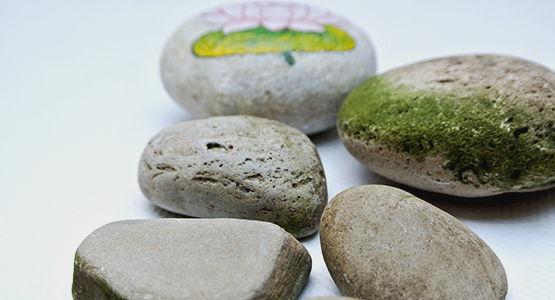In Ayurveda, awareness and healthy living go hand-in-hand. It guides your path to wellbeing on many levels. Pay attention to what you eat and how you live. Listen to your body. Think about your daily decisions. Make choices that serve you well. Like “Grandma’s wisdom,” awareness is really just common sense.
As covered in an earlier post, you come into this world as a unique individual. You can see this in your genetic code. Ayurveda takes it a step further, recognizing that your Birth Constitution blends the emotional, mental and even spiritual fibers of who you are. As you travel through life, your individuality takes you on a unique journey. Along the way, your health is determined by your genetic make-up, plus what you eat and what you do every day.
Ayurveda explains that the way to stay healthy, or in harmony, is to give your body what it needs (sleep, wholesome food, ample exercise, etc.). If you do, your natural intelligence—on its own—will maintain health, happiness and wellbeing. If you don’t provide the right support, you compromise your natural intelligence. The disease process begins. Raising your awareness helps you avoid this outcome.
Awareness is nothing more than taking a few seconds to think about the consequences of your decisions. It applies to just about everything—from choosing what foods you will eat to selecting the beauty, household and outdoor products you will use. Everything has an impact on your wellbeing, your community and the planet. The key is to be aware of that impact, so you make the best decisions possible.
Intuitively, we all know what we need to do to stay healthy. But it’s surprisingly easy to ignore the signs when thoughts and feelings enter the picture. The best way to heighten your awareness is by making a habit of listening to your body. Through all kinds of clues, it tells you how it is reacting to your daily diet and lifestyle decisions. We have a simple, yet powerful, exercise to help you get started. It has already helped many people by providing eye-opening examples of cause and effect.
Download Ayureka’s Diet and Activity Worksheet. For the next several days, log what you do in the left column and how you feel in the right column. Be detailed and thorough—really document your life.
In the left-hand column detail the following:
- Meals, snack, drinks, medications and supplements: This exercise is about raising awareness, not judging. Take note of everything you ingest!
- Sleep: Include the duration and quality of your sleep along with any disruptions or awakenings.
- Exercise: Be specific about what you are doing, how long you are doing it for and how your body is reacting to it. Are you just breaking a sweat? Sweating profusely? Put it all down.
- Routine and schedule: Note the specifics in your daily routine, including the time, no matter how small or inconsequential they may seem (waking up, showering, leaving for work, eating lunch, driving home, etc.)
- Elimination: In Ayurveda, your feces, urine and sweat are very telling. Try to track the frequency of your elimination along with any applicable specifics like shape, size, color, presence of odor, etc. (Just think about how joyful your inner child will be to explore this topic!)
- Activities: What are you doing when you’re not working? Driving the kids to a soccer game? Hanging out with friends? Watching a movie? Write it down.
- Chemicals: Working around the house with some extra-strength cleaner? How many different products—including beauty, skincare, hair care, deodorant, etc.—are touching your body daily? Take note of every one. (This tally is usually a bit of a shocker.)
In the right-hand column, journal on the following:
- Mood: Pay close attention to your feelings. When you feel a shift in emotion, record it. How you feel when you awaken in the morning? During conversations throughout the day? Before bed? Get in touch with what your emotions are telling you.
- Energy level: How is your energy early in the morning? Mid-afternoon? After each meal? Pay close attention. Is your stamina higher at different times during the day?
- Cravings or loss of appetite: Urges for snacks or particular foods are very telling. So is the absence of hunger at regular mealtimes. Keep an eye on these areas.
- Physical reaction: How does your body feel? Any aches and pains? Specific areas of the body calling to you? If you experience any physical symptoms—like bloating, gas, swollen limbs, lethargy—list them out.
After you’ve recorded a few days in your life, set aside some time to study your notes. Look for patterns. Do you spring out of bed well rested? Are you having a bowel movement every day? Are you dying for a sweet-treat come 3 p.m.? Are you waking up every night around 3 a.m.? Did you break a sweat daily?
Through this analysis, you can identify diet and lifestyle habits that have unwanted consequences. For example, certain lunch choices might consistently lead to tiredness or sugar cravings later in the afternoon. A bout of insomnia might follow an especially rigorous late-night workout at the gym, a late night dinner or that regular glass of wine. On days your morning routine is disrupted, you might later experience constipation. Observations like these help to increase your awareness.
The beauty of awareness is that it empowers you to change things up. The beauty of Ayurveda is that it helps you understand what will work for you. Once you are aware of the root cause of an issue, Ayurveda provides you with guidelines for exploration. Cooking with whole foods. Trying new types of exercise. Re-thinking your routine and habits. When awareness and Ayurvedic knowledge are both in the mix, you discover all kinds of exciting new ways to boost your wellbeing. And it’s surprisingly fun!


